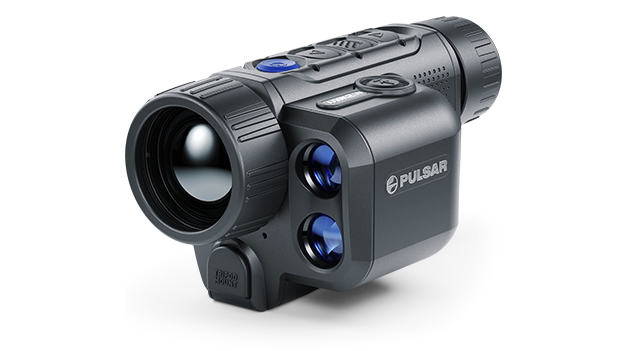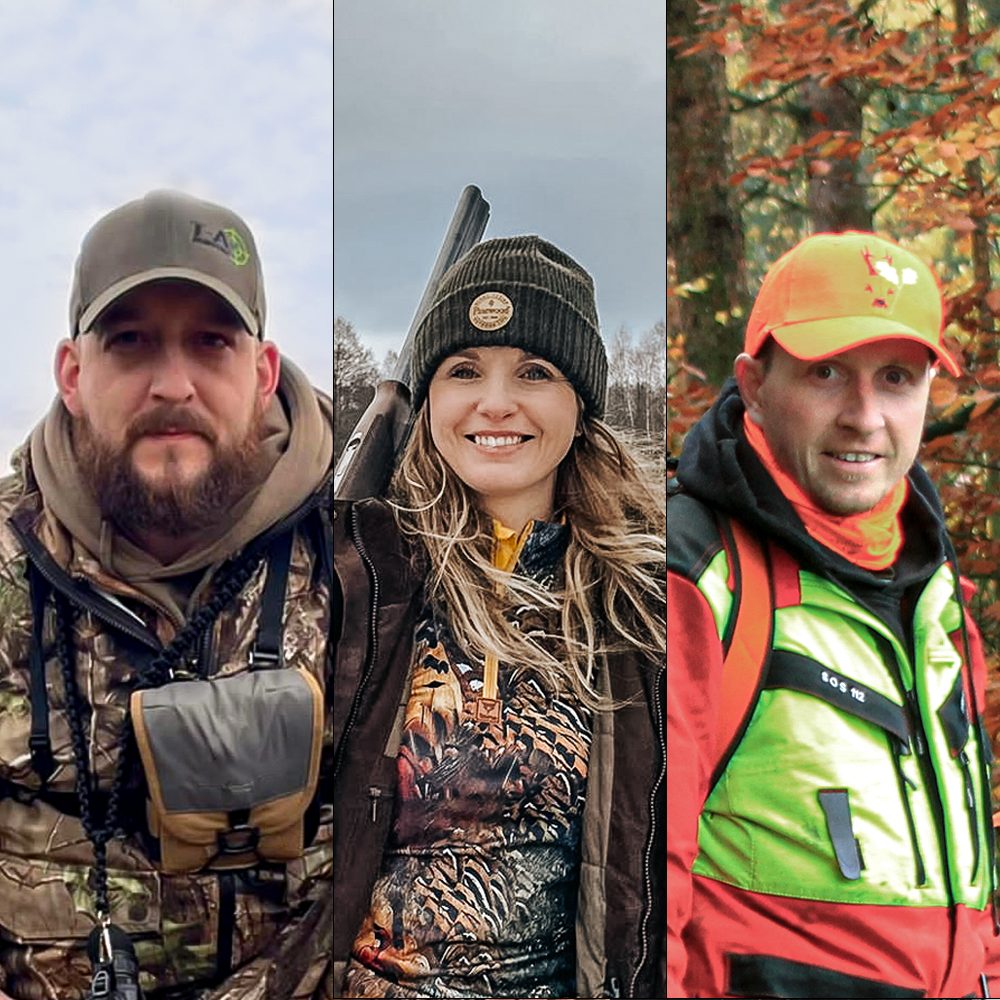Professional hunters always seem extremely knowledgeable and confident. But it hasn’t always been like that – they made mistakes, asked questions, and didn’t know a lot of things. To acknowledge how far they’ve come, we’ve asked our brand ambassadors to share some advice they would give to their younger selves. Read on to find out what Agnieszka Walczak from Poland, Freddy Lietz from Germany, and Kevin Murphy from the UK wish they knew when they just started hunting.
Let’s start with the seemingly most obvious thing – how do you choose the first gun?
Agnieszka: Determine your budget, define what gun you are looking for (wood or synthetic material, thumbhole material, caliber, etc.), ask experienced colleagues for advice (but remember that everyone has their own opinion and you should stick to your priorities), go to a trusted hunting shop, talk to an advisor, and, most importantly, take the gun into your own hands and check if it fits you.
Freddy: During the training, you will learn how to shoot with different weapons. It quickly becomes clear which weapon suits you best. The caliber, of course, depends on the species. But often, it doesn’t have to be the most expensive weapon with the best telescopic sight. For me, the scope was much more important than the gun itself.
Kevin: I wish I had a better understanding of ammunition, the difference between calibers, and the pros and cons of each to get me the needed results.
How to pick the right gear to start with?
Freddy: The right equipment for the beginning remains a matter of attitude. Personally, I think that every young hunter should determine what kind of hunting they are likely to do the most.
There is equipment that one should always have as standard equipment, and there is equipment that can be obtained over time. In the beginning, I find it important to have a weapon with a suitable scope, binoculars, and a thermal imaging device. If you gain some experience over time and maybe even have hunting preferences, you can then improve your equipment and gear.
Kevin: Like most people, I had so much on my list of gear I would have loved to own but quickly found out I didn’t need half of it! Start out with the basics, and over time, you will build up and own better-quality gear.
Agnieszka: Everyone has their own opinion about what is the right gear. If you can, test the gear before buying. Maybe your colleagues have something you’re planning to purchase, and you can try it before making the decision?
Often, it doesn't have to be the most expensive weapon with the best telescopic sight. For me, the scope was much more important than the gun itself.
Freddy Lietz
What’s the first Pulsar device you should get, and why?
Kevin: This really depends on your budget, but after owning the Digex C50, I believe it’s the best all-around scope because of its great price point and day and night capabilities.
Freddy: At that time, my first Pulsar device was the Helion XQ50F. I personally think it depends on how much money you want to invest. If I had to make a recommendation, the Axion or Helion would be the perfect entry-level device.
Agnieszka: It depends on the budget you have and on the type of device you’re looking at – a riflescope, scope, or binoculars? Axion 2 LRF XQ35 is a great device for those who wish to start their adventures with thermal vision and look for great value for money. But if you can, go to the nearest Pulsar dealer in your country or visit the hunting fairs where you will find the Pulsar devices and watch the products live.
How to get more experience?
Kevin: This one’s easy! Learn from others in the community and be open-minded and grateful for any experience you can gain from seasoned hunters.
Agnieszka: Be in your hunting area as much as you can. If there is a possibility, visit it with an experienced hunter from whom you will learn about hunting, game, and the hunting ground.
Agnieszka Walczak
Be humble, gain experience, learn from experienced colleagues, and enjoy your passion.
Which places are the best to hunt for beginners?
Agnieszka: The place you know and visit a lot before starting your hunting adventure. This way, you build your experience. Every hunt teaches you something. You should know the ground (where the water reservoirs, passages, and game refuges are, the land development) and the habits of the game during the whole year.
Freddy: In order to gain as much experience as possible, I would personally always choose a hunting ground that offers many opportunities – field, forest, and water. You can observe different wild species and learn about their behavior. In addition, a mixed hunting ground is very versatile.
Kevin: I found smallholdings like horse paddocks or chicken farms are good practice for shooting small game.
What are the things you absolutely must do when you’re just starting hunting?
Kevin: Practice, practice, practice. Work on all aspects of hunting, learn your rifle, and how to be safe with it.
Agnieszka: Listen to the advice of experienced colleagues, be in the field as much as possible, and read valuable literature.
Freddy: As a passionate hunter, I can recommend going with an experienced hunter at the beginning. A young hunter can learn many things about the hunt, the game, and the hunting ground over a period of one year. It is best to have an experienced hunter by your side.
Axion 2 LRF XQ35 is a great device for those who wish to start their adventures with thermal vision and look for great value for money.
Agnieszka Walczak

Thermal Imaging Scope
Discover moreWhat are the things you absolutely should not do (but maybe did) when you started hunting?
Agnieszka: Think that you are the best hunter, and you know everything just because you have a hunting license.
Kevin: Do not hunt live quarry until you are confident with your rifle or gear, and always be sure you are able to shoot safely and humanely.
Freddy: If the owner of the hunting ground sets up rules, you should stick to them. Not just as a sign of respect, but because he already knows what to do. For example, you should not leave the high seat before the end of a driven hunt. If the hunting ground owner gives you the opportunity to hunt a roebuck, you should clarify all important questions in advance in order to avoid unnecessary stress.
What’s the biggest hunting mistake you ever made?
Freddy: My biggest mistake was a wrong roebuck at the beginning of my hunting time. I couldn’t wait and wasn’t calm enough – I was just nervous. There was a lack of calmness and prudence to see that I still have more time to see a suitable roebuck or other game.
Kevin: Not learning my ground! I didn’t spend enough time learning my ground, meaning a lot of wasted time trying to learn the habits and locations of the animals later.
What’s the single most important tip you would give to your younger self?
Freddy: If you have passed your hunting exam and are a young hunter, always remember that you are still at the beginning of a long journey. You never stop learning, but always learn more.
Agnieszka: Be humble, gain experience, learn from experienced colleagues, and enjoy your passion.
Kevin: Learn from others, be grateful and open-minded to any opportunity you are given to be out with other more experienced hunters. And DON’T RUSH!
Before purchasing any night or thermal vision device, please make sure you adhere to the local legislation and only use it when it is allowed. Our ambassadors come from various countries and travel a lot, which allows them to test different devices. We do not encourage or support the illegal use of our devices in any events. If you wish to learn more about export and sales restriction policy, please visit the following link: Export and Sales Restriction Policy.

